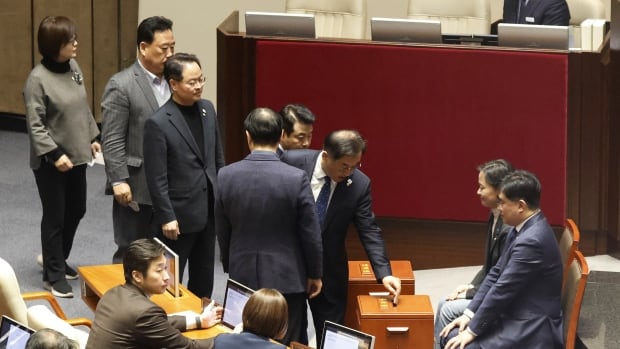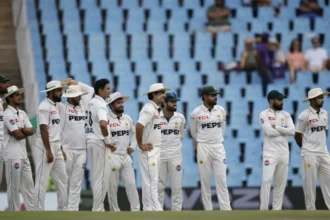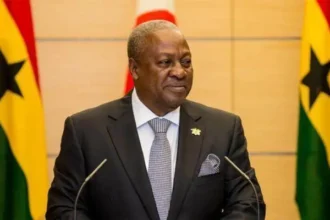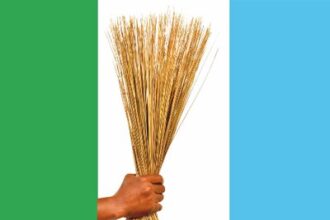A South Korean legislative initiative to impeach President Yoon Suk Yeol over his short-lived imposition of martial law failed Saturday after most lawmakers from his ruling conservative party boycotted the vote.
The rejection of the motion is expected to intensify public protests calling for Yoon's ouster and deepen political chaos in South Korea, with a poll suggesting a majority of South Koreans support impeaching the president.
Yoon's declaration on martial law has drawn criticism from his own ruling conservative party, but he is also determined to oppose Yoon's impeachment, apparently because he fears losing the presidency to liberals.
Yoon's impeachment required the support of two-thirds of the National Assembly, or 200 of its 300 members. The opposition parties that presented the impeachment motion had 192 seats, but only three MPs from the PPP participated in the vote. The motion was abandoned without a vote count because the number of votes did not reach 200.
National Assembly Speaker Woo Won Shik called the result “very regrettable” and an embarrassing moment for the country's democracy, which is closely watched by the world.
“The failure to hold a qualified vote on this issue means that we have not even been able to exercise the democratic procedure to decide a crucial national issue,” he said.

Opposition parties could submit a new impeachment motion after the opening of a new parliamentary session next Wednesday.
The Democratic Party, South Korea's main opposition, said it would not give up its attempt to impeach Yoon. But Yoon's People Power Party said it would find a “more orderly and responsible” way to resolve the crisis than impeaching the president.
There are fears that Yoon will not be able to complete his two and a half years in office as his leadership has taken a huge hit. Many experts say some ruling party lawmakers could eventually join opposition parties' efforts to impeach Yoon if public demands to do so increase further.
If Yoon is impeached, his powers will be suspended until the Constitutional Court decides to remove him from office. If he is removed, an election for his replacement must take place within 60 days.
MPs called to vote several times
Woo repeatedly urged ruling party members to return to the House to participate in the vote, waiting several hours before arriving.
At one point, Democratic Party leaders went to a room upstairs below the main chamber, where PPP lawmakers were gathered, to try to persuade them to vote. After being blocked from entering, they angrily accused conservative leaders of preventing lawmakers from voting freely.
Earlier on Saturday, Yoon issued a public apology over the martial law decree, saying he would not shirk legal or political responsibility for the declaration and vowing not to make another attempt to impose martial law. . He said he would leave it to his party to chart a path forward through the country's political turmoil, “including issues related to my tenure.”
“The declaration of this martial law was born out of my despair. But in the course of its implementation, it has caused anxiety and inconvenience to the public. I am truly sorry for this and sincerely apologize to the people who must have been very shocked,” Yoon said.
Since taking office in 2022, Yoon has struggled to push his agenda through an opposition-controlled parliament and has struggled with low approval ratings amid scandals involving him and his wife .
In his martial law announcement Tuesday night, Yoon called Parliament a “den of criminals” that bogs down state affairs and vowed to eliminate “shameless North Korea supporters and anti-North Korea forces.” states”.
The unrest resulting from Yoon's bizarre and poorly thought-out coup has paralyzed South Korean politics and sparked concern among major diplomatic partners like the United States and Japan.
Troops surrounded the Parliament building
On Tuesday evening, special forces troops surrounded the parliament building and army helicopters flew overhead, but the army withdrew after the National Assembly voted unanimously to cancel the decree, requiring Yoon to raise it before dawn on Wednesday. The declaration of martial law was the first of its kind in more than 40 years in South Korea. Eighteen ruling party lawmakers voted to reject Yoon's martial law decree, alongside opposition lawmakers.
Yoon's speech fueled speculation that he and his party may push for a constitutional amendment to shorten his term, instead of agreeing to impeachment, to ease public anger over of matrimonial law and to facilitate Yoon's early exit from office.
Jeremy Chan, senior analyst for China and Northeast Asia at Eurasia Group, says South Korean President Yoon Suk Yeol's tenure is likely under threat after lawmakers, including members of his own party, unanimously rejected his declaration of martial law. Yoon's term was set to end in 2027, but he will likely face articles of direct impeachment in the coming weeks, Chan said.
Lee Jae-myung, head of the Democratic Party, the main liberal opposition party, told reporters that Yoon's speech was “very disappointing” and that the only path forward was his immediate resignation or impeachment. His party called Yoon's martial law an “unconstitutional and illegal rebellion or coup.”
Passage of the motion to impeach Yoon appeared more likely on Friday when the chairman of Yoon's party called for his impeachment on Friday, but the party remained formally opposed to impeachment.
On Saturday, tens of thousands of people gathered on several blocks leading to the National Assembly, waving banners, shouting slogans and dancing and singing K-pop songs whose lyrics were altered to call for Yoon's ouster.
Protesters also gathered outside the PPP headquarters near the Assembly, angrily shouting at lawmakers to vote to impeach Yoon.

A smaller crowd of Yoon supporters, which still appeared to number in the thousands, gathered in separate streets of Seoul, denouncing the impeachment attempt as unconstitutional.
Lawmakers on Saturday voted for the first time on a bill appointing a special prosecutor to investigate allegations of stock price manipulation involving Yoon's wife. Some MPs from Yoon's party were seen leaving the room after the vote, sparking angry shouts from opposition MPs.
On Friday, PPP Chairman Han Dong-hun, who criticized Yoon's declaration on martial law, said he had received intelligence that during the brief period of martial law, Yoon had ordered the commander of the country's defense counterintelligence to arrest and detain unspecified key politicians on “anti-espionage” charges. -the activities of the State.”
Hong Jang-won, first deputy director of South Korea's National Intelligence Service, told lawmakers in a closed-door news briefing Friday that Yoon ordered him to help the defense counterintelligence unit to arrest key politicians. The targeted politicians included Han, Lee and Woo, according to Kim Byung-kee, one of the lawmakers present at the meeting.
The Defense Ministry announced Friday that it had suspended three military commanders, including the head of the defense counterintelligence unit, for their involvement in the enforcement of martial law.
Vice Defense Minister Kim Seon Ho told Parliament that Defense Minister Kim Yong Hyun ordered the deployment of troops to the National Assembly after Yoon imposed martial law. Opposition parties accused Kim of recommending Yoon implement martial law.
Kim resigned Thursday and prosecutors imposed a foreign travel ban on him.
#Attempt #impeach #South #Korean #president #fails #ruling #party #boycotts #vote
News/World ,












